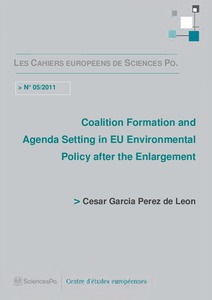Coalition formation and agenda setting in EU environmental policy after the enlargement
"The eastern enlargement of the EU has greatly increased the heterogeneity in the configuration of preferences of European member states. This scenario was expected to significantly difficult the capacity of the legislative process to take decisions. However, the decision-making in the EU has s...
| Main Author: | |
|---|---|
| Institution: | ETUI-European Trade Union Institute |
| Format: | TEXT |
| Language: | English |
| Published: |
Paris
2011
Centre d'études européennes de Sciences Po |
| Subjects: | |
| Online Access: | https://www.labourline.org/KENTIKA-19136444124919546269-Coalition-formation-and-agenda.htm |
| Summary: | "The eastern enlargement of the EU has greatly increased the heterogeneity in the configuration of preferences of European member states. This scenario was expected to significantly difficult the capacity of the legislative process to take decisions. However, the decision-making in the EU has shown a remarkable capacity of adaptation in the face of the entrance of new members. This article argues that this adaptation is indeed normal. I introduce a mixed model of coalitional bargaining and agenda setting which explains legislative decision making in the face of preference heterogeneity. The model shows how coalition formation incorporates the preference variations infused by new member states in surplus winning coalitions adopting moderate compromises and how the intervention of a supranational EP influences the final decision towards more advanced legislation. The application of the model to the area of environmental policy shows that under the conditions of preference heterogeneity of the enlargement context, the EU legislative process is likely to generate legislation at medium levels of policy change, appeasing the risk for deadlock but also restraining the introduction of more integrationist legislation." |
|---|---|
| Physical Description: | 38 p. Digital |

